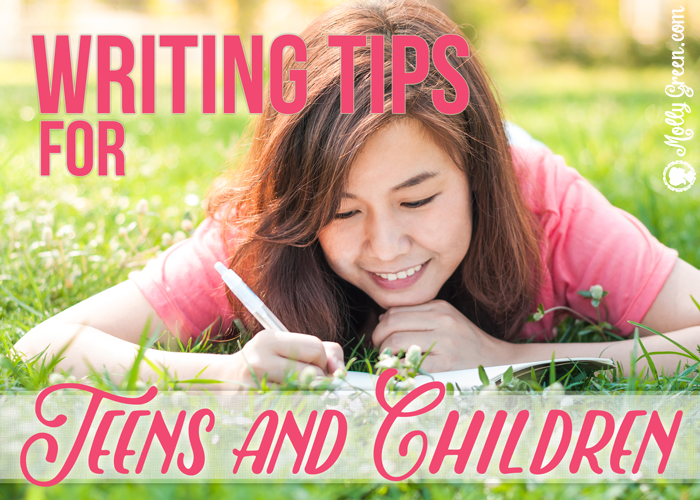By Karen Whiting
Whether you are writing a paper for schoolwork or want to write your own story for fun, there are some tips that will improve your piece.
- Every piece, even a poem, needs structure and a purpose. You need a beginning, middle, and ending. There needs to be a logical progression of how you move from the start to the finish. There needs to be a reason for writing the piece.
- Be focused. Keep on your topic. Reread your opening or thesis statement to remind yourself of the focus and what message you want to give the reader.
- Active verbs always work better than passive ones and the more specific the better. So, instead of he came in, use a verb for walking like strolled, stomped, glided, tiptoed, or strutted. Notice how each provides a different image.
- Passive verbs to avoid are: be, been, being, am, is, are, were, do, did, may, can, must, might, shall, will, would, should, could, have, has, had.
- Circle every verb after you write your draft. Ask yourself if there’s a better verb to replace the one used.
- The opening lines (or even page) are often a warm-up. Your mind is beginning to get in gear. Consider chopping off that beginning and find the place where the piece really starts.
- Be creative. Avoid clichés and phrases everyone uses. Try creating your own simile or metaphor.
- Show rather than tell. Use verbs and strong nouns to show feelings and action.
Notice the Difference
Stronger verbs and more specific nouns give life to words. Here’s an example:
Boring:
The noisy wind scared the children. (This tells but does not show)
Better: (Use sounds and verbs to show the wind and the noises it makes)
Bang! The door shut!
Rattle, rattle, rattle the windows shook.
Rustle, rustle, rustle went the leaves
Hhhhoooowwwlllll went the wind as it squeezed through branches.
Or use actions with sounds.
Woosh! The boat shook!
Crash! Bang! The boat slammed into the rocks
Whack! The little boat smashed into pieces.
Yes, You Can Get Published!
Devo-zine (see link below) and other magazines for teens pay for the material they accept.
You can also attend a writer’s conference, especially one that has a track for teens. Go to www.writehisanswer.com/ to find annual opportunities: one in Colorado and one in the Philadelphia area.
A little daily practice with writing and rewriting will make a difference. Let the first draft flow without trying to edit as you write. Then let the piece sit a day or two before editing and polishing your work. Applying the tips above will help you improve each story or article you write for better grades and possible publication.
Karen Whiting (www.karenwhiting.com) is an international speaker, award-winning author of nineteen books, and former Miami educational television host of Puppets on Parade.
LINKS
TeenLit
www.teenlit.com/teens.php is an up and coming resource for young writers (non-profit organization). It offers writing workshops, forums for writers and the ability to publish work for review and critique by other writers on the site.
Devo-zine
Teen devotional magazine that pays. It uses a theme list you can find online. 150-250 word count.
http://devozine.upperroom.org/write-for-us/writers-guidelines/
Girls’ Life: Girls younger than 18 can submit articles, poetry, and short fiction to: Website Editor, Girls’ Life Magazine, 4517 Harford Road, Baltimore, MD 21214 or email submissions to [email protected].
Teen Ink is “a monthly print magazine website, and a book series all written by teens for teens.” They accept submissions from writers 13 to 19 years old. http://www.teenink.com/
Young Playwrights, Inc.: YPI runs two playwriting contests for writers 18 years old or younger. One is a national contest and the other is for NYC students.
Bookjobs.com: Information for students who are interested in working in publishing. It contains a wealth of information, including company profiles, links to publishing study programs, a guide to which majors may fit best with which publishing departments, and a glossary of publishing terms. Free registration provides additional access to job and internship information.
Reading Rainbow’s Writing Contest:
http://pbskids.org. For Kindergarten through 3rd grade students.
Here is a new online magazine where kids can get published:
http://www.launchpadmag.com
The Claudia Ann Seaman poetry contest for high school students:
http://polyphonyhs.com/submit/claudia-ann-seaman-award/
A site for teen writers with contests, publication possibilities, and education:
http://www.merlynspen.org/us/





